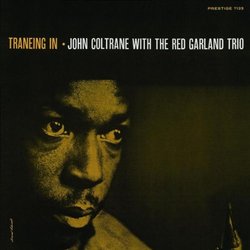A generous side of John Coltrane
Anthony Cooper | Louisville, KY United States | 05/20/2007
(4 out of 5 stars)
"The first thing you might notice about Traneing In is that the Red Garland Trio is listed prominently. Perhaps because of this, John Coltrane gives more space to the rhythm section than usual. Red, Paul Chambers, and Art Taylor have the stage to themselves for the first 3:43 of the CD, then Coltrane comes in. Coltrane's playing is very good throughout this CD. The program isn't very adventerous -- "Giant Steps" is still two years away -- "Traneing In" has two Coltrane originals and three minor standards. The songs range from lively midtempos ("Traneing In" & "Bass Blues") to slow ("Slow Dance" & "You Leave Me Breathless") to speedy (the misleadingly named "Soft Lights and Sweet Music"). This is a good Coltrane CD, not one of his classics, but if you've already gotten the top rank Coltranes, you should add this to your list.
"
Was Irving pleased?
Samuel Chell | Kenosha,, WI United States | 03/14/2008
(5 out of 5 stars)
"This is one of two dates featuring Coltrane with Red Garland's trio, each introducing Coltrane's "sheets of sound" approach to an Irving Berlin song. On "Soultrane" the tune is "Russian Lullaby" (though the reason that album has a slight edge is Coltrane's performance of Billy Eckstine's "I Want to Talk About You" (far more conservative but no less engaging than his fabled performance of the same tune on the later "Live at Birdland" Impulse album). On "Traneing In" the Berlin tune is "Soft Lights and Sweet Music" (which will strike those not attracted to Coltrane's sound and harmonies as a misnomer). Given Berlin's attraction throughout his career to "black music" (even Doris Day's 1950s recording of Berlin's "Shakin' the Blues Away" invites a preliminary advisory to today's sensitive listeners), I have a hunch America's greatest songwriter would have been/was flattered to have had these two songs performed by arguably the most innovative and influential jazz man of the past 50 years.
Once again, this is a recording serving as a reminder of what an enormously gifted pianist Red Garland was (as a former boxer, if he was half as nimble in the ring as on the keys, he must have excelled there as well). Regrettably, by 1965 Red was out of sight, out of mind, finishing out his career in Dallas neglected if not ignored (his playing suffering for it, as is evident on the rare recordings he was lured into making after the mid-sixties)."


 Track Listings (5) - Disc #1
Track Listings (5) - Disc #1